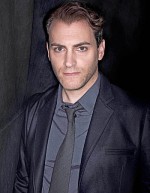Column Name
Title
While Michael Stuhlbarg (Group 21) isn’t too quick to call this his “breakout moment,” he will admit that his on-air time now is the most it’s ever been. With three movie releases this fall—Martin McDonagh’s Seven Psychopaths in October, Steven Spielberg’s Lincoln on November 16, and Sacha Gervasi’s Hitchcock on November 23—plus the start of his third season as Arnold Rothstein in HBO’s Boardwalk Empire, Stulhbarg is keeping busy in front of the camera.
Body
On October 11, at the first installment of this year’s Lunch With an Alum series, Stuhlbarg talked shop with the fourth-year drama students. Take care of your body, don’t ever shortchange yourself, and surprise yourself are just a few of the lessons he imparted between tales of his time at Juilliard and the years that followed.
Stuhlbarg remembers his years at Juilliard (1988-92) as a time of change. “Some of the practices we learned we were meant not to question and I think at that time there began a re-evaluation of what the Juilliard Drama Division meant, what it was, where it’s going,” he said in an interview with The Journal after the Lunch With an Alum. He recalled Judy Leibowitz and Moni Yakin’s classes as being some of the most memorable at Juilliard—they taught him to stretch his physical capabilities and release tension. (He also studied briefly with mime artist Marcel Marceau, though he quickly learned he didn’t want to pursue that career path.)
As an actor who has experimented with weight gain, weight loss, shaving his head and growing various styles of facial hair to get into character, Stuhlbarg is well-versed in physical awareness. He gained 25 pounds for his role as a café owner in Lincoln Center Theater’s production of Martha Clarke and Charles L. Mee’s Belle Epoch, and the following year, he gained an additional 25 pounds for one of his favorite roles—his Tony-nominated turn in Martin McDonagh’s The Pillowman (2005). (“I didn’t want to wear a fat suit,” he told the fourth-year actors.) When he played a transient old man in Sam Shepard’s Fool for Love at U.C.L.A., where he studied for two years before transferring to Juilliard, he didn’t bathe for three weeks, rolled around in dirt, hid in bushes, and drank a lot of alcohol. “Everyone has to address those [transformations] themselves, everyone has to make choices themselves,” he said in the interview. “At the time that I did those things I was inspired to do them but they wreaked havoc with my metabolism.”
A less taxing, but more unusual, way that Stuhlbarg prepares for roles is drawing. Though he began acting when he was 11 and growing up in Long Beach, Calif., he also dreamed of being a cartoonist or an architect. He now fulfills this love by drawing his characters and what he thinks they might look like. “I like to lose myself in that stuff,” he said.
Until recently, most of Stuhlbarg’s roles were on the stage. Major parts have included title roles in the Shakespeare in the Park Hamlet (2008) and the Public Theater’s Richard II (1994). Currently, though, his biggest credits are almost exclusively on the big screen: a mafia hit man in Seven Psychopaths, Hitchcock’s agent Lew Wasserman in Hitchcock, and a dentist in next summer’s Woody Allen movie (as yet unnamed). He’s also a small-screen fixture, currently playing gangster Rothstein, the man best known for fixing the 1919 World Series, in Boardwalk Empire—CNN.com’s Marquee blog recently hailed him as “one of TV’s most eloquent gangsters ever.”
But despite his increased exposure, Stuhlbarg has not lost sight of his roots. “I feel really lucky to have been able to go here. I feel like I learned a lot and was treated well while I was here,” he said of his time at Juilliard, while admitting that “in some cases it was tough love.” While he had a lot of fun with his classmates—“really smart, talented, creative, loving people,” many of them, he noted, “aren’t in the business anymore.” As for where he sees himself in the future, Stuhlbarg’s goal is simple: being, hopefully, “very happy.”





